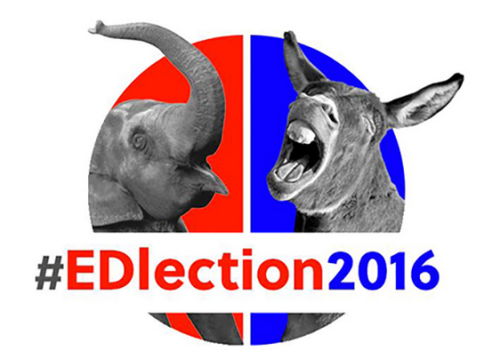by Jeanne Allen
The 74
July 20, 2016
Donald Trump’s attacks on Hillary Clinton were returned recently at the annual meeting of the American Federation of Teachers, the nation’s second-largest union, and the one representing most of the urban teachers in this country.
“Mike Pence is one of the most extreme vice presidential picks in a generation,” Clinton said. “And he’s one of the most hostile politicians in America when it comes to public education. Neither Mike Pence nor Donald Trump should be anywhere near our children’s education.”
Those words were the equivalent of throwing red meat to the wolves, as the union crowd erupted into cheers, hoots, and hollers.
Similarly, education reformers — activists, donors, lawmakers — are taking sides and reacting across social media, each about their respective outrages.
I understand how it is to feel adamant about a candidate. I have tweeted my way through a political season. But advocates for true education reform must be willing to pass judgment on policy positions before condemning policy proponents.
Such unity hardly seems possible when Clinton’s union supporters are feeding anti-school choice talking points to legions of members that their schools will disappear under a Trump-Pence administration. And Trump supporters organized in the blogosphere use different calling cards to strike a similar fear in parents, focusing on the impact a Clinton administration would have on the hearts and minds of their children, with the loss of local control and teachers unions in charge of the U.S. Department of Education.
Finding any middle path or “common” ground will be hard. And for many ed reformers, the pair of candidates presents a Hobson’s choice.
But it need not be so.
We have, as the saying goes, no permanent allies nor permanent enemies, just a never-ending interest in bettering education. Those who care passionately about education should be willing to work with anyone who is equally as passionate.
It doesn’t mean they will get your vote. But we need their ear now, and we need an open door with whoever wins. We must be willing to recognize any candidate that supports the core policies and principles of education innovation and opportunity, or call them out for their opposition, no matter who they are or what they espouse on other issues that may be near and dear to our hearts.
Why? Because history shows us that this is how we succeed.
The development of education reform is rich in strange bedfellows that locked arms in and outside of elections. People came together on policies that disrupted the status quo, recognizing that the most important issue facing our country is the education of our youth.
Wisconsin state Rep. Polly Williams was a member of the Black Panthers. She was also a partner with Conservative Republican Gov. Tommy Thompson to make vouchers a reality for poor children in Milwaukee and pave the way for greater school improvement throughout Wisconsin.
The fact that Democrats once called Pennsylvania Gov. Tom Ridge every name in the book didn’t stop state Rep. Dwight Evans, an African-American Philadelphian who is now in line to enter Congress, from uniting with Ridge to create the state’s charter school law. Republicans fought against it to preserve local control, and Democrats fought against it to preserve the current system’s power. Sound familiar?
And in Cleveland, where the Republican Party is current perched, the late great City Councilwoman Fannie Lewis told everyone that she didn’t care who she worked with so long as they could help save her babies in her city. She joined hands with George Voinovich, a Republican governor, and free market, conservative donors to fight for school choice. And fight they did, all the way to the U.S. Supreme Court.
At least a dozen other such alliances have had transformational results in education in cities and states nationwide. Florida’s scholarship programs enjoy majority support in the black and Latino caucuses, even among Democrats. They partner with Republican Gov. Rick Scott, their arch-nemesis, on other issues.
Polar opposites and divisions in reform have always existed, but for years, politicians were willing to look beyond the most extreme of differences, because reformers did too.
Truly committed to parent power?
On the same page in support of policies and practices that produce the innovation, flexibility, and transparency to create those opportunities that hold the key to better schools for all children?
Then let’s put down our ideological swords, roll up our sleeves, and make it happen.
Let’s go back to the future. Lawmakers in statehouses nationwide and in Congress would welcome it. Policymakers and think tank researchers want it.
And our kids deserve it.

